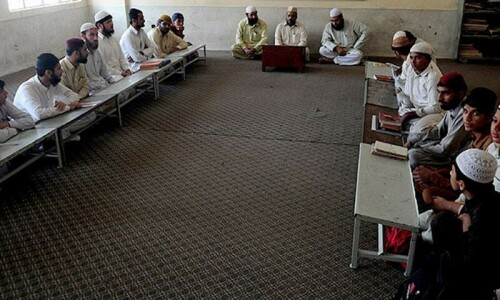ISLAMABAD: The government’s decision to give another three-year term to Army Chief Gen Qamar Javed Bajwa has set off a debate in the country.
While many analysts including some former army officers, a few television anchors and ministers hailed and justified the move, some of the opposition politicians as well as representatives of the legal fraternity questioned the rationale behind the decision.
The opposition Pakistan Peoples Party (PPP), which during its last tenure gave a similar three-year second term to then army chief Gen Ashfaq Parvez Kayani, described it as an undesirable action that could undermine the morale of the troops.
Senator Farhatullah Babar of the PPP said that extensions in service were not advisable and should not be viewed favourably.
“It impacts adversely on the career prospects of scores of offices in the hierarchy and consequently on their morale. Army is a strong institution and strong institutions do not depend on individuals no matter howsoever competent and brilliant,” he maintained.
Mr Babar recalled that “history teaches us the fragility of structures dependent on individuals. No one is indispensable. It is not a good message to send across that the institution of the army is dependent on one or two individuals”.
He reminded Prime Minister Imran Khan of his past stance on the issue of extensions and how he welcomed former army chief Gen Raheel Sharif when 10 months before his scheduled retirement he announced that he was not considering any extension.
Mr Khan, then as an opposition leader, tweeted on Jan 25, 2016: “The nation’s respect for General Raheel Sharif has gone up after his statement refusing to seek an extension.”
The PPP leader questioned the logic behind a different view on extension this time. “If he then thought that the nation’s respect for an individual was enhanced by refusing an extension what made him think that it will enhance the respect this time around by accepting the extension. … He has made yet another U-turn.”
The Awami National Party in its reaction termed the government’s decision “a payback” and feared that it could politicise the institution.
Vice chairman of the Pakistan Bar Council (PBC) Syed Amjad Shah described the extension given to Gen Bajwa by the federal government as an unwelcome step.
In a statement, he said that the party in power had always claimed that it believed in strengthening of institutions for good governance that was vital for progress and stability of the country.
He suggested to the government to withdraw its decision to grant extension to the incumbent chief of the army staff and instead appoint a new army chief on the principle of seniority and competence, of course, after the incumbent army chief retired upon successful completion of his normal service tenure.
It is imperative and in the national interest as well as for ensuring good governance and strengthening institutions, including the institution of defence forces, the PBC vice chairman emphasised.
He contended that Monday’s decision to grant extension in service of the army chief was not only the negation of its oft-repeated claim, but also against the national interest and amounted to weakening the very important institution of the armed forces.
‘‘There are no two opinions that only the strong institutions, and not individuals, can play the vital and important role in the merit-oriented good governance and progress of the country and as such it is in the great national interest that the government and all others concerned should make endeavours and pursuits for achieving that objective,’’ Mr Shah said.
However, many other politicians as well as analysts contended that the decision was necessitated by the situation.
Defence analyst retired Lt Gen Amjad Shoaib, while defending the decision, said that exceptional regional situation warranted an extension for Gen Bajwa, otherwise it was preferable that institution’s systems functioned normally.
Referring to one of his earlier conversations with Gen Bajwa, whom he described as a simple and straightforward person, Gen Shoaib said he [Gen Bajwa] too was convinced that he should retire in time.
But, he added, a sudden change in the regional situation, especially the developing scenario in Afghanistan and India-held Kashmir, caused the rethink.
Regional governments, he claimed, were very comfortable with Gen Bajwa and the government was “not confident” that it would be able to smoothly handle regional matters if Gen Bajwa were to leave.
Published in Dawn, August 21st, 2019














































